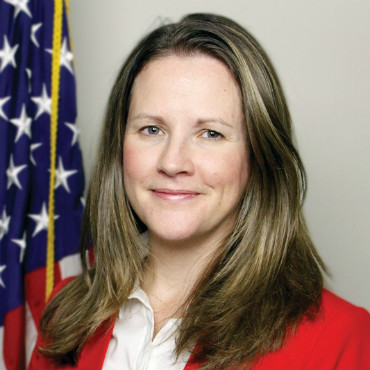Why Beth Angerman sees a shared-services opportunity

Hacks, tight budgets and oversight are driving a governmentwide push to shared services.

Shared-services guru Beth Angerman believes that trends in IT and management are driving agencies to outsource common functions to other agencies.
The Office of Personnel Management breach, the Cybersecurity National Action Plan and a shift to category management in procurement have altered the federal government's approach to IT operations and will fuel the ongoing drive to share services, according to a senior federal executive.
Beth Angerman, executive director of the General Services Administration's Unified Shared Services Management, said those developments have combined with tightening budgets to stimulate the demand for shared services, and her job is to lead the way.
Housed in GSA's Office of Governmentwide Policy, USSM was chartered by the Office of Management and Budget last fall to shape federal strategy for sharing services across functions, providers and consumers.
Angerman said USSM plans to issue a shared-services playbook in July to help agencies with planning. The document will include best practices from agencies that have successfully implemented shared services.
"The product will be detailed," she said, and include specific information such as how to identify a good agency to provide shared services, what other agencies are buying and what a successful implementation looks like.
Angerman was detailed to GSA last October from the Treasury Department, where she was executive director of the Office of Financial Innovation and Transformation. Treasury has become a resource for shared financial and procurement services.
As a concept, shared services have been on federal officials' minds for years because of the potential cost savings and efficiencies they promise. However, previous efforts were ad hoc and uncoordinated.
Things are different now, Angerman said. USSM is aligned with tighter controls on budgets, category management efforts and other federal efficiency programs, she added. The $3.1 billion IT Modernization Fund (ITMF), included in President Barack Obama's budget request to Congress, could also play a key role. Lawmakers are still considering whether to approve the plan.
"Everything is coming together to tell a story -- ITMF, category management and shared services," Angerman said. "Agencies are looking at how their organization handles risk."
Shared services are high on the Obama administration's to-do list for another reason that's on the minds of IT managers everywhere -- cybersecurity.
Trevor Rudolph, chief of OMB's Cyber and National Security Unit, said shared services are one of a few critical cybersecurity efforts the White House is banking on. Shared services, securing high-value assets, ITMF, enhanced cybersecurity workforce skills and Department of Homeland Security cyber defense teams are the pillars that will support the federal government's cybersecurity efforts in the coming years, Rudolph told the Information Security and Privacy Advisory Board during a June 15 presentation.
Angerman said agencies' cybersecurity risk assessments are driving the move toward shared services because agencies must look for other ways to provide services more efficiently. For instance, federal agencies spend billions to keep legacy systems going. To access ITMF money, she added, they must build business cases that will involve weighing the cost of implementing new systems versus going with trusted services from another agency.
After the OPM breach, "agencies are beginning to understand their own risk and considering options," she said.
Angerman is confident that given the convergence of so many management and security efforts across government, shared services will take hold, even with a looming administration change.
"The concept of shared services has a long life," she said. "They're generally not partisan" because the savings and efficiencies they can provide address continuing pressures on the government to shrink budgets while increasing security.


